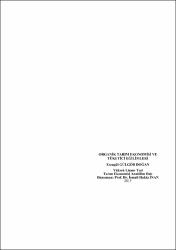| dc.contributor.author | DOĞAN, Esengül GÜLGÖR | |
| dc.date.accessioned | 2017-08-25T11:10:30Z | |
| dc.date.available | 2017-08-25T11:10:30Z | |
| dc.date.issued | 2017 | |
| dc.identifier.uri | https://hdl.handle.net/20.500.11776/2371 | |
| dc.description.abstract | Organik tarım, insan sağlığını ve doğal kaynakları, bitki ve hayvan genetiğini korumak ve kimyasal kullanımından kaynaklanan sorunları en aza indirmek amacıyla kullanılan bir yöntemdir. Kimyasal girdilerin kullanılmadığı organik tarım üretiminde, üretimden tüketime kadar organik tarımın her aşaması kontrollü ve sertifikalı olarak yapılmaktadır. Bu hassasiyetle gelişim gösteren organik tarım, günümüzde ticaret hacmi hızla büyüyen ve talebi giderek yükselen bir pazar olmuştur. Bu araştırmanın amacı, Türkiye'deki tüketicilerin organik ürün tüketim eğilimlerini belirlemektir. İstanbul ilinde bulunan semtler araştırma kapsamına alınmış, oransal örnekleme yöntemi ile 167 tüketici ile anketler doldurularak orijinal veriler elde edilmiştir. Çalışmada elde edilen verilere ki-kare analizi, bağımlılık katsayı testleri uygulanarak analizler yapılmış, sonuç ve öneriler oluşturulmuştur. Anketlerden elde edilen veriler sonucunda tüketicilerin sosyo-demografik özellikleri açıklanmış ve bu özelliklerin organik ürün tüketimi üzerindeki etkisini incelemek üzere elde edilen sonuçlar değerlendirilmiştir. Elde edilen araştırma sonuçlarına göre bireylerin organik ürünleri tüketme ve tüketmeme sebepleri ortaya koyulmuş ve gelecekte organik ürün tüketimine olumlu bakıp bakmadıkları belirlenmiştir. Tüketiciler, %53 oran ile 5 yıldan fazla süredir organik ürün tüketmektedirler. Organik tarım hakkındaki düşünceleri sorulduğunda ise en yüksek ve aynı oranlarda (Likert Ölçek Analizi'ne göre 6 üzerinden 5,37 puan) sağlığa yararlı olduğunu ve tüm organik ürünlerin sertifikalandırılması gerektiği yanıtları alınmıştır. Tüketiciler büyük çoğunlukta (%14,90) organik ürünleri daha ucuz olmaları koşulunda alacaklarını belirtirken %53 oranla fiyatlarını yüksek bulmaları ve %49 oranla alma konularındaki engellerinin başında yüksek fiyat gelmesi ile bu durumu desteklemektedirler. Özel sektör çalışanlarından çoğu ileride semt/halk pazarlarından ve kendi çiftlik/bahçelerinden alışverişlerini yapmak istemektedirler. Ayrıca, 65 yaş ve üzeri tüketicilerin organik ürünler konusundaki bilgi kaynakları eş-dost tavsiyesidir. Üniversite mezunu 36 tüketicinin bilgi kaynağı internettir. | en_US |
| dc.description.abstract | Organic farming is a method that is used to protect human health, natural sources and genetics of plants and animals and to minimize the problems arising by usage of chemicals. In organic farming production there is no use of any chemical composition which is certificated and under regulation control from production to consumption at every stage. Organic farming has recently become a rapidly growing market in volume and in demand. The aim of this research is to determine consumer trends of organic products in Turkey. The districts located in the province of Istanbul were included in the scope of the research, and the original data were obtained by filling in questionnaires with 167 consumers. In this study, Chi-square analysis and Dependence Coefficient test by applying the analysis, conclusions and recommendations was created. As a result of the data obtained from the survey, socio-demographic characteristics of consumers were explained and socio-demographic characteristics were evaluated to examine the impact on consumption of organic products of the consumers. According to the results of the survey, the reasons of individuals' consumption or nonconsumption of organic products and whether the individuals were favourable about the consumption of organic products in the future. 53% of the consumers prefer to buy organic farming products for more than five years. When asked them their thoughts on organic farming, most of them (regarding to the Likert Scale Analysis the rate is 5,37 of 6) replied as it is heathy and they should be certified without any exception. The consumers mostly, around 14,90%, expressed that they would buy the organic food if its price is lower. Besides 53% told that organic food prices were high and 49% of the survey listed the price of the organic food as the barrier against buying organic farming products. Many of the private sector employee wants to go to public markets for organic farming products shopping in the short run and they are willing to go shopping in their farms in the long run. In addition, the information source of the 65 years and older consumers is the recommendation coming from their friend network. Today for the university graduates, internet is the main information source. | en_US |
| dc.language.iso | tur | en_US |
| dc.publisher | Namık Kemal Üniversitesi | en_US |
| dc.rights | info:eu-repo/semantics/openAccess | en_US |
| dc.subject | Organik Tarım | en_US |
| dc.subject | Organik Ürün | en_US |
| dc.subject | Ekonomi | en_US |
| dc.subject | Tüketim | en_US |
| dc.subject | Tüketici Eğilimleri | en_US |
| dc.subject | Organic Farming | en_US |
| dc.subject | Organic Product | en_US |
| dc.subject | Economics | en_US |
| dc.subject | Consumption | en_US |
| dc.subject | Consumer Trends | en_US |
| dc.title | Organik tarım ekonomisi ve tüketici eğilimleri | en_US |
| dc.title.alternative | Economy of organic farming and consumer trends | en_US |
| dc.type | masterThesis | en_US |
| dc.department | Enstitüler, Fen Bilimleri Enstitüsü, Tarım Ekonomisi Ana Bilim Dalı | en_US |
| dc.relation.publicationcategory | Tez | en_US |



















